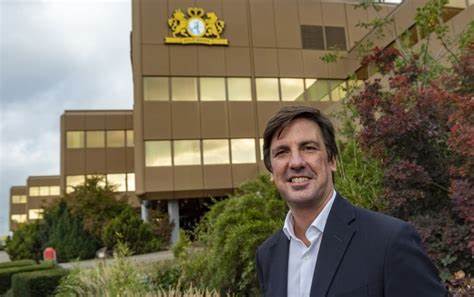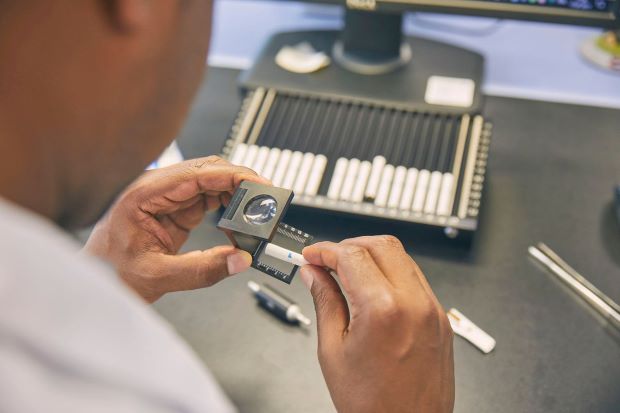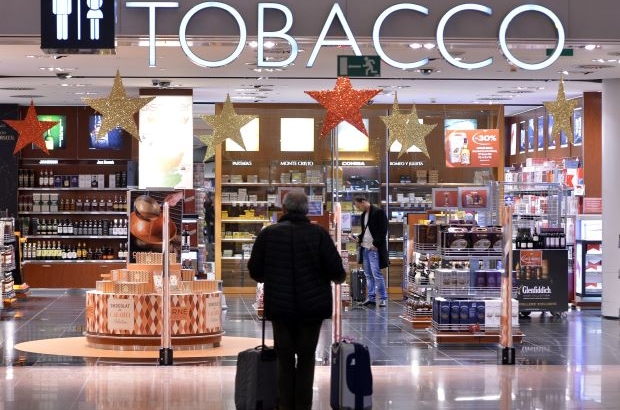- Daily & Weekly newsletters
- Buy & download The Bulletin
- Comment on our articles
The future of tobacco: As Belgium steps up its anti-smoking plan, industry giant Philip Morris calls for better access to alternative products
As the price of a packet of cigarettes rises by 25% and the cost of vaping peaks with a new tax, PMI Benelux Managing Director Miguel Matos insists the company is equally committed to the government’s target of a smoke-free generation. In its shift to alternative products, now representing 36% of total net revenue, he agrees cigarettes now belong in a museum.
What are your goals for the alternative tobacco product market in the Benelux?
Our priority is a smoke free future. Our aim is to inform every adult smoker who decides to continue consuming nicotine about our alternative products. Since their launch a few years ago, we now have numerous independent scientific institutions confirming their benefits compared to conventional cigarettes, including the US FDA, the Dutch RIVM, the German BfR and Belgium’s Superior Health Council. Two things need to happen: we need to inform consumers about the scientific information behind these products and they need access to them.

Yet in Belgium and some other countries, your products, including IQOS, are banned or restricted?
Countries are going into totally different directions in translating this scientific information into policies. Sweden is endorsing smoke-free oral usage with products like snus and nicotine pouches, resulting in only 5% of smokers and 40% fewer smoking-related diseases. Belgium’s banning of nicotine pouches is a bit of a contradiction because the government wants to achieve a smoke-free generation, commonly accepted as being 5% or less smokers, and these products can accelerate the transition.
Another example is heated tobacco, a product that offers a better alternative in places such as my home country, Portugal. Half a million smokers there decided to quit smoking and change to heated tobacco. Yet, it is still not commercialised in Belgium, and the reason is that regulators are applying the same regulations as to conventional cigarettes. We’re being asked for the same packaging, the same health warnings and images as conventional cigarettes. This is despite the EU tobacco directive saying these products should have a different health warning.
How does IQOS compare to other alternative products?
IQOS and heated tobacco was a technology developed with the principle of removing combustion so that you heat but don’t burn tobacco. It removes 90-95% of the harmful chemicals emitted by a conventional cigarette, which has a big public health impact. Some 72% of IQOS users are exclusive consumers. They get the full benefits, which you don’t if you alternate between conventional cigarettes and alternative products. This is a much higher conversion rate compared to electronic cigarettes. It’s a much closer experience to conventional cigarettes because real tobacco is used. This helps the harm reduction equation of having a product that is both acceptable to smokers and with a significant risk reduction. That’s why their use has grown in countries such as Japan, Portugal, Greece and Italy. Other advantages are the lack of odour and ash, so it does not have negative impact on indoor air quality.

Belgium’s tobacco plan for a smoke-free generation doesn’t differentiate between conventional and alternative products. Why is that?
One is the precautionary principle that if these products are not completely risk free, why should we endorse them? It’s a fair question, but we have the scientific evidence that they remove the majority of toxic emissions. Belgium’s 2 million smokers should know that one product is better than the other. It’s a missed opportunity to not inform people about better options.
The second reason is the youth debate, mainly concerning electronic cigarettes. We fully agree minors should not have access to nicotine products and we regularly communicate this to our retailers. The flavours should also be regulated so that youth are not attracted to them. We defend excise taxes on these products so that they are less attractive from a price perspective. All our evidence shows that heated tobacco does not appeal to youth; a further reason to introduce them in countries like Belgium.
How much of a problem is illicit tobacco in the Benelux?
Counterfeit and contraband are on the rise in the Benelux, and in particular in Belgium, so it’s a major priority. In Belgium, one in 10 cigarettes smoked is illicit; this means a loss for us as an industry and an estimated €250 million loss for the government in tax revenues. Consumers are also at risk for buying a product of questionable quality. The police are tackling the issue and we are collaborating with them. In 2023, six illicit factories were found, which is probably only a sample of the bigger picture. They are old warehouses with very primary conditions. Sometimes illegal immigrants are working there and producing the cigarettes in almost inhumane conditions.
One avenue to address this issue is to fight it together with the authorities and find more ways to detect illicit activities, the other should be to look at policies in other countries that further provoke the situation. This includes the new €2 increase on a packet of 20 cigarettes in Belgium. If we look at France and the heavy taxation imposed (€12 a packet), we see that today, 1 in 3 consumed cigarettes is illegal. We don’t want Belgium to go in the same direction. We have around 24% of smokers in Belgium [percentage total smokers] and this model of high taxes, high smoking rate, high illicit trade, is not sustainable because the aim of increasing taxes is to reduce consumption.
How do tobacco companies earn a more trusted role in the smoking debate?
We can be part of the solution and we want an unbiased conversation based on facts and science. It’s not being judged on the past but what can happen in the future. Together we can transform, accelerate the migration of adult smokers to different alternative products. This involves talking to regulators, scientists, universities and media. If you ask smokers what they think about new products, you see all sort of answers. People don’t have enough information; many still think nicotine is the issue. While it’s not harm-free, it’s not the main cause of smoking-related diseases.

We’ve invested $10 billion in alternatives. Our centre in Switzerland brings products to the market that are proven to be scientifically safer and offer better choices for smokers. People who switch to smoke-free products are really quitting smoking. We’re doing our part and can’t be judged just because we’re part of big tobacco. We can always do more, that’s why we want to debate these topics. We have a common objective with the government in Belgium as well as many other EU countries for a smoke free generation. We all want to put cigarettes in a museum and the way to do it is together.
How is PMI tackling the need to become a more sustainable industry?
The best way to become more sustainable is to invest in different areas, starting with alternative products. Then there’s the social aspect, how we treat people and how we conduct our business in a responsible way. On the environment question, we have a factory in the Netherlands that we want to be carbon neutral by 2025. We are already using almost 100% renewables energies. On the problem of cigarette butt litter, we conduct educational campaigns in countries where it is socially acceptable for them to be thrown on the ground and where they can end up in the sewage system.
What is your reaction to Belgium’s Single Use Plastic (SUP) legislation and gradual ban of items including tobacco filters?
We agree in principle with it, along with supporting the transition to a circular economy via innovation, sustainable models and technology, but we are puzzled by the way Belgium is transposing the EU directive in a way that goes against some of its principles. It does not incentivise companies to innovate; producers will be charged the same amount, whatever the composition of their waste and regardless of having plastic or not. The country will pay the highest cost of any SUP transposition in the EU, €181 million, three times more per capita than the Netherlands, Finland or Germany. Six other EU states have raised questions about how Belgium is transposing the directive and there are also questions on how the amounts are calculated, which is by regional agreement with no common parameters to calculate the cost between Flanders, Wallonia and Brussels.
So what is the future of traditional cigarettes?
I really hope we can stop selling traditional cigarettes as fast as possible. If that’s difficult to hear from a tobacco company then it’s very important to be clear: we want to stop commercialising conventional cigarettes and we can’t do it from one day to another because illicit tobacco sales would go through the roof. So, we have to work with the consumer and regulators. We could phase out cigarettes in 10 years’ time, but the way forward is not to forbid them. I do believe that we will see more and more countries becoming smoke free and then we should see the benefits in public health.
This coverage is supported by PMI. This support enables the Bulletin to devote additional editorial resources to cover the topic more widely and deeply. The Bulletin’s editorial content is independent of its supporters.
Photos: ©Belga/Eric Lalmand; Miguel Matos; PMI e-cigarette product; PMI scientific research
















Comments
So the idea of people not being addicted to some sort of product they produce and sell is simply not acceptable?